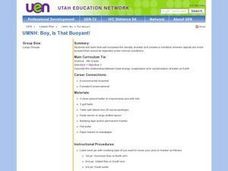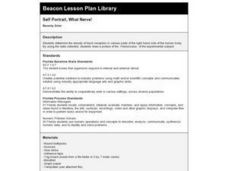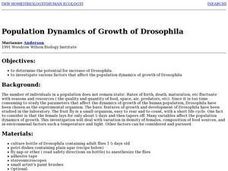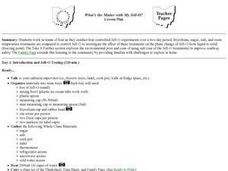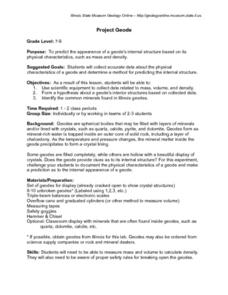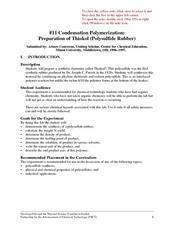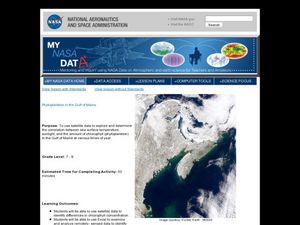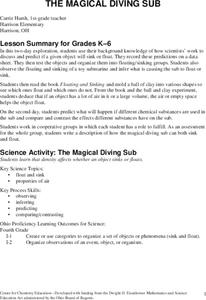Curated OER
Boy, Is That Buoyant!
Fourth graders see that salt increases the density of water and creates a condition wherein objects are more buoyant than would be expected under normal conditions. They describe the relationship between heat energy, evaporation and...
Curated OER
Self Portrait, What Nerve!
Students conduct an experiment to determine the distance between touch receptor fields in parts of the right-hand side of the body. They enter data into the data table.
Curated OER
What is an Estuary?
Students define the terms estuary and watershed. They conduct an experiment to determine the density differences between fresh and saltwater. They examine the salinity distribution of the Peconic Bay Estuary.
Curated OER
Herb is the Word
Young scholars conduct an experiment to determine how different soils affect plant growth over a six-week period. After determining the physical properties of different types of soil, students plant various types of seeds into the soil...
Curated OER
Science Lesson #2
Fourth graders explore and experiment with objects that float to see if they float differently in salt water or fresh water. After the experiment, they write a paragraph in their science journal explaining how fresh water and ocean water...
Curated OER
Detecting Magnetic Materials in "Martian" Soil
Students simulate some of the Pathfinder experiments by devising methods of collecting and measuring magnetic substances in pseudo-Martian soil. The efficiency of each of the methods used to collect materials is evaluated in this lesson.
Curated OER
Population Dynamics of Growth of Drosophila
Young scholars experiment with Drosophila to determine if density of female flies, food sources, temperature and light affect the population dynamics of growth. Students graph their data and compare their results to the number of human...
Curated OER
Size Per Unit
Fifth graders investigate how to find the average and the concept of a per unit quantity and its applications. They also make connections of using population density and how to find the speed with its relating formula. This is bringing...
Curated OER
Changes Inside Planets
Students investigate the concept of planetary differentiation. They complete an experiment to simulate it using gelatin and food. The lesson includes vocabulary to increase reading comprehension skills as part of the inquiry. The lesson...
Curated OER
Bell Live! The Great Lakes: A Superior Adventure
Students participate in a virtual field trip to Lake Superior. In groups, they perform experiments in which test the level of toxins and bacteria in the water. They also watch video segments life in the lake and discuss their observations.
Curated OER
Emulsion_ Compulsion
Middle schoolers experiment with common household products to determine the properties of emulsions and how they fit into the classifications of matter through this series of lessons.
Curated OER
STABLE ANGLES OF SLOPES
Students conduct an experiment using soil and shoeboxes to explore factors controlling and affecting the slope of a hillside. They analyze angles, surfaces, etc. to gain an understanding of instability of slopes.
Curated OER
What's the Matter with My Jell-o?
Students work in teams of four as they conduct four controlled Jell-O experiments over a two-day period. The Family Page extends this learning to the community by providing families with challenges to explore at home.
Curated OER
What Floats Your Boat?
Students discover the Archimedes principle through a buoyancy experiment. They measure the water displacement of a lump a clay which is denser than water then reshape the clay into a bowl which floats but displaces more water.
Curated OER
Not a Drop to Drink
Students design an experiment to determine which liquid is water. In this chemistry lesson, students perform the experiment as outlined in their design. They record observation and formulate conclusion.
Curated OER
Earth History Part II
Eighth graders hypothesize what caused the break up of continents. In this earth science lesson, 8th graders study about the events that took place during Mesozoic and Cenozoic Era. They reconstruct a supercontinent and report their...
Curated OER
Project Geode
Young geologists attempt to predict the appearnace of a geode's internal structure based on how it looks from the outside, its mass, and its physical characteristics. In this geologly lesson, learners use scientific equipment to collect...
Curated OER
Real-World Projects: Challenges from the Polymer Industry
Two scenarios are presented for chemistry detectives to decipher. Both require the use of an infrared spectrometer and focus on the examination of polymer materials. In the first, lumps in polyethylene bottles are analyzed. In the...
Curated OER
Condensation Polymerization: Preparation of Thiokoll® (Polysulfide Rubber)
This lab activity is geared toward experienced chemistry learners, in particular, those who are familiar with organic chemistry. They will create a synthetic elastomer and then make observations and measurements of its different...
Virginia Department of Education
Organizing Topic: Data Analysis
Learners engage in six activities to lead them through the process of conducting a thorough analysis of data. Pupils work with calculating standard deviations and z-scores, finding the area under a normal curve, and sampling...
Curated OER
Dry Ice: Simply Sublime
A fascinating instructional activity on states of matter is here for your young scientists. Dry ice is used to challenge learners preconceived notions about how solids work. They discover all sorts of interesting facts about states of...
Curated OER
Phytoplankton in the Gulf of Maine
Students use satellite data to see the correlation between sea temperature and sunlight in the Gulf of Maine. In this phytoplankton instructional activity students use Excel to analyze data.
Curated OER
The Magical Diving Sub
First graders discuss and predict if a given object sinks or floats. They record their predictions on a data sheet. Pupils test the objects and organize them into floating/sinking groups. Students observe the floating and sinking of a...
Curated OER
How Much is There to Eat?
Learners research population and food consumption rates for different areas of the world.
Other popular searches
- Liquid Density Experiments
- Density Experiments Physics
- Solid Density Experiments
- Water Density Experiments
- Glycerin Density Experiments
- Metals Density Experiments
- Wood Density Experiments
- Matter Density Experiments
- Density Experiments Bread
- Gycerin Density Experiments
- Density Experiments Sugar
- Gas Density Experiments
